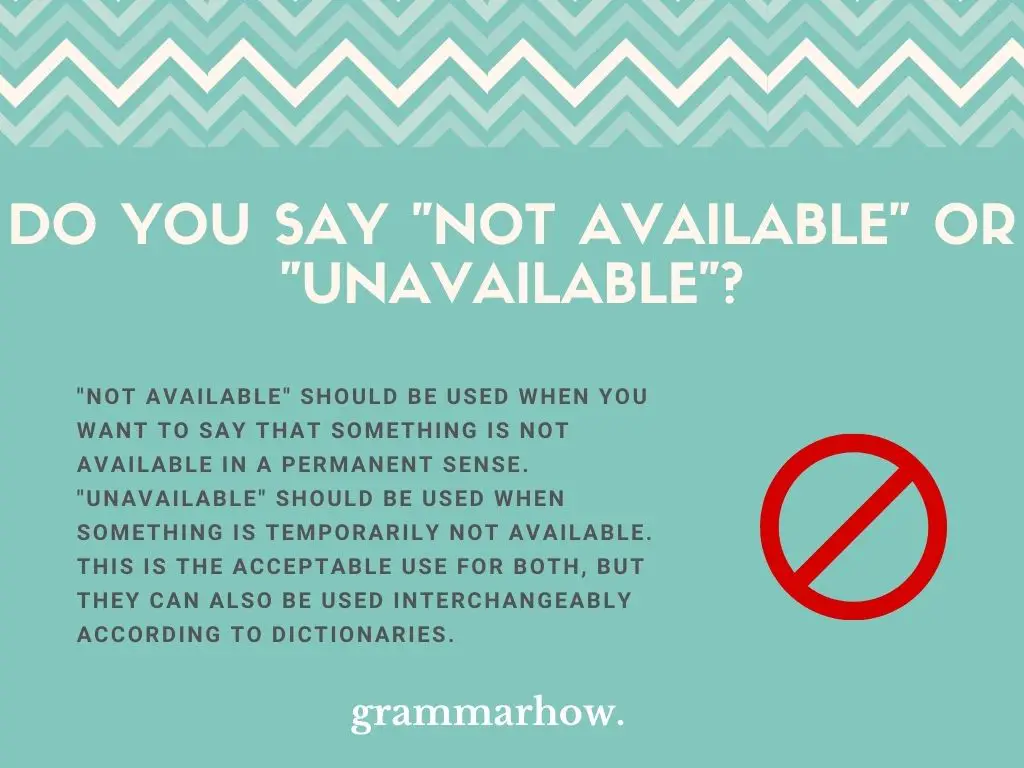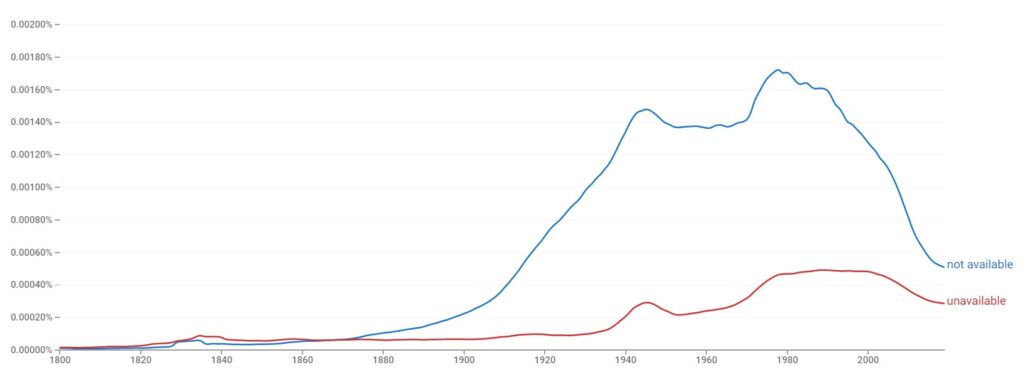Using the prefix “un-” before a word means it’s the opposite of the word. Take “unavailable” as an example. It means that something is “not available,” but what does “not available” mean when we say it instead? In this article, we will look at the differences between them.
Do You Say “Not Available” Or “Unavailable”?
“Not available” should be used when you want to say that something is not available in a permanent sense. “Unavailable” should be used when something is temporarily not available. This is the acceptable use for both, but they can also be used interchangeably according to dictionaries.

The meaning of “unavailable,” according to The Cambridge Dictionary, is something that “you cannot get it or use.” Or, if you talk about a person being “unavailable,” it means “they are not able to talk to people or meet people, usually because they are doing other things.”
We can also look at this graph to see the difference in usage of the words in literature. When we look at them in this way, we’re considering them as interchangeable options. As you can see, “not available” is generally the more popular choice of the two.

What Does It Mean If Something Is Not Available?
When something is seen as “not available,” it can mean two things. The first is simply that the thing is not available at this current time (if we used it interchangeably with “unavailable”). However, the second definition is what we want to focus on here.
When something is “not available,” it means that it is either no longer available to do or access, or it was never available and never will be available to some.
We think of the phrase “not available” as a more permanent way to say that something is “unavailable” to us. When we use it, we typically talk about things rather than people because for a person to be “not available,” it would likely mean something more morbid than we intend.
However, it’s possible for things and activities to be seen as “not available” if they never existed in the first place.
- That service is not available here.
This is a great way to show you what we mean about the permanent aspect of the phrase. It means that the “service” isn’t available in that place, implying that you’ll have to go somewhere else if you want to utilize it.
How Do You Use Not Available?
To help you understand better, we’ll include a few examples. We’ll make sure to use “not available” in a more permanent sense to separate it from “unavailable,” too.
“Not available” is mostly used when you talk about things rather than people. The permanent aspect of it is better used for things and activities.
- I’m sorry, but the service you require is not available at this hotel.
- We’ve been told that our room is not available anymore. What does that even mean?
- What you’re looking for is not available in this country.
- We’ll need to talk about what you want because it’s not available in our system.
- Your old house is not available. We tore it down three weeks ago.
- We don’t offer that service here. It’s not available, and we don’t want you to ask again.
From these examples, we can see that “not available” is generally more permanent in most senses. We use it when we want to state that something isn’t available to someone, and they must either look elsewhere or drop the idea.
What Does It Mean If Something Is Unavailable?
When something (or someone) is unavailable, it’s generally seen in a more temporary state. Remember, “unavailable” and “not available” are synonymous, so you can use either one, but we’ll focus on the temporary meaning of “unavailable” here.
When something is “unavailable,” it means that currently, that thing is not ready to use or talk to. However, it’s also implied that at some point in the future, that thing might be “available” again. It is not a permanent state of unavailability.
You might say that someone is “unavailable” when they don’t want to be around for something or if they have other things to keep them busy. It’s typical for bosses and managers to be “unavailable” during meetings or when they’re needed if they’re busy with other things.
How Do You Use Unavailable?
Let’s go over when we might be able to use “unavailable” in a sentence. Remember, this word can be used for both people and things, so use it whenever you want to talk about a temporary absence.
- The boss is unavailable right now, so you’ll have to wait.
- We’re sorry, but the President is unavailable for comment.
- The room you want is unavailable at this moment!
- You’re always unavailable when I need to speak to you!
- The phone line says it’s unavailable.
- We’re unavailable to reach until we’re back from vacation.
When we use “unavailable,” we’re always talking about the more temporary arrangement.
What Is The Abbreviation For “Not Available”?
Sometimes, we might see that information or data is not available, and when that’s the case, we like to use an abbreviation to keep things streamlined and easy to navigate.
The abbreviation for “not available” is “N/A,” meaning that some of the information or data is not available. We use it when we either couldn’t find the information, or it doesn’t apply to the rest of the findings.
Synonyms For “Not Available” And “Unavailable”
Finally, let’s go over a few synonyms that work for either of the words. You might be able to say one of these instead if you want to talk about someone or something not being ready to do something else.
- Preoccupied
If someone is preoccupied, it means they’ve already got something that’s taking up most of their time, and you have to wait before they’re able to talk to you.
- Busy
This one is much simpler and is used frequently to say that someone or something is otherwise engaged. You must again wait until it becomes available.
- Inaccessible
This one applies mostly to things rather than people. You can use it to say that you can’t reach something or can’t get to it.
You may also like:
Not Able Or Unable? Difference Explained (Helpful Examples)
Unaccessible vs. Inaccessible – Which is Correct?

Martin holds a Master’s degree in Finance and International Business. He has six years of experience in professional communication with clients, executives, and colleagues. Furthermore, he has teaching experience from Aarhus University. Martin has been featured as an expert in communication and teaching on Forbes and Shopify. Read more about Martin here.
